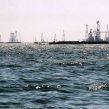
Azerbaijan-Turkmenistan Relations: Shattered Brotherhood
Publication: Eurasia Daily Monitor Volume: 9 Issue: 122
By:

Azerbaijan-Turkmenistan relations, which experienced a significant thaw since the death of Turkmen President Saparmurat Niyazov (Turkmenbashi), deteriorated again last week (June 19). The most recent conflict began when Turkmenistan started undertaking seismic work on a disputed oilfield in the Caspian Sea. The oilfield, discovered by Azerbaijani geologists, is called Kapyaz in Azeri and Serdar in Turkmen. Reserves in the oilfield total around 150 million barrels of oil. In response, the Azerbaijani Foreign Ministry summoned Turkmenistan’s ambassador in Baku, Toyly Komekov, where Deputy Foreign Minister Khalaf Khalafov expressed Azerbaijan`s strong protest over the violation of the agreement. The Azerbaijani Foreign Ministry reminded Ambassador Komekov that the two Caspian littoral states’ presidents agreed in 2008 that no exploration work or production would be carried out at the Kapyaz field until all issues on the division of the seabed are resolved. During the meeting, Baku indicated that Turkmenistan`s unlawful activities are unacceptable and that Azerbaijan reserves the right to defend its sovereign rights in the Caspian Sea (Azernews, June 20). The Turkmenistani Embassy was quick to respond to the Azerbaijani Foreign Ministry’s declaration. In a statement issued the next day, it claimed that Azerbaijan’s State Border Service took unlawful actions against a civilian vessel carrying out scientific research work in the non-Azerbaijani sector of the Caspian. The Embassy warned that adequate measures would be taken if such actions continue (Turan, June 21).
The State Oil Company of Azerbaijan (SOCAR) also joined the Ministry of Foreign Affairs and issued a statement on Friday clarifying its position. Suleyman Gasimov, the vice-president of SOCAR for economic issues, stated that the status of the Kapyaz oilfield was disputable since it was situated on the middle line of the Caspian (abc.az, June 22). He further asserted that Azerbaijan had approached Turkmenistan several times with proposals to develop the oilfield jointly, but the issue is still not resolved because of the murky legal status of the Caspian Sea.
This was not the first instance of deteriorating bilateral relations in the Caspian. Since 1997, Azerbaijan and Turkmenistan have sporadically been involved in several diplomatic fracases, but each time without further escalation. In all cases, the Turkmenistani side claimed that Azerbaijan was actively exploiting oilfields belonging to Ashgabat. Since 2006, relations improved significantly, leading to the mutual reopening of embassies and Turkmenistani President Gurbanguly Berdimuhamedov’s official visit to Azerbaijan. Local experts believe that the current escalation should be assessed through the prism of the geopolitical situation in the region and not in the context of bilateral relations. Other neighboring countries could just as easily have been involved in the recent deterioration of relations. Azerbaijani political expert Arastun Orujlu stated that Turkmenistan’s actions were mostly pushed and encouraged by Russia, which feels threatened by any developments that may cause Moscow to lose its energy export monopoly in Europe. As evidence, Orujlu claimed that Ashgabat’s provocation followed right after US Secretary of State Hilary Clinton’s visit to the region during which she supported joint projects between Azerbaijan and Turkmenistan (Turan, June 23). Such cooperation in the energy sector would have contributed to eventually opening up a corridor for non-Russian Caspian basin energy to be shipped to Europe, thus undermining Moscow’s export hold on the continent. However, Orujlu did not believe the current diplomatic row would ultimately result in serious military or political consequences for Azerbaijani-Turkmenistani relations.
In its turn, the pro-Russian and sometimes alarmist Regnum news agency states that Iran may have been the main behind-the-scenes player in the recent events. During the “diplomatic war” between Baku and Tehran last month, Iran was preparing its own response to Azerbaijan. It is not surprising then that Iran was able to persuade Turkmenistan to start provocation against Azerbaijan. If this interpretation of the events is correct, Iran may be expected to more overtly get into the “game” soon (Regnum, June 21).
Ilham Shaban, the head of the Center for Oil Studies in Baku, cast more doubt on Turkmenistan’s actions being a unilateral decision originating in Ashgabat. Shaban observed that the latest diplomatic conflict between Turkmenistan and Azerbaijan is purely political and not economic. He further noted that the Azerbaijani proposal to develop the Caspian oilfield jointly would also have been in Turkmenistan’s best interest. Ashgabat does not have enough oil drilling facilities nor human capacity to undertake drilling in the Caspian by itself. Thus, it is suspicious and illogical for Turkmenistan to think about exploring the Caspian without the capacity to do so. Meanwhile, Kapyaz is not a large enough oilfield over which to sacrifice the proposed TransCaspian gas pipeline that Turkmenistan is trying to build with Azerbaijan (Zerkalo, Ekho, June 23).
Meanwhile, amid the Baku-Ashgabat tensions, Russian military exercises began on June 18 in the Caspian Sea. Around 15 military ships and 300 Russian personnel are involved in the exercises. Baku-based political scientist Zardusht Alizade believes that Russia is trying to show its power in the Caspian using the veil of anti-terror operations (Ekho, June 23).
So far, no official statement has been made by either Caspian country’s president, thus leaving space open for negotiations. It is interesting that the worsening of Baku-Ashgabat relations occurred during the Turkmenistani President’s absence, who was visiting Brazil for a UN conference on sustainable development. What is clear, however, is that the conflict should be resolved immediately. Any delay may tempt third countries, both inside and outside of the region, to get involved.




